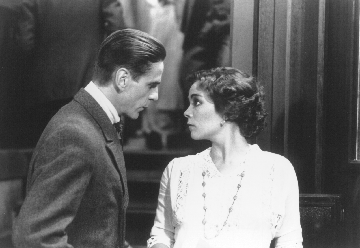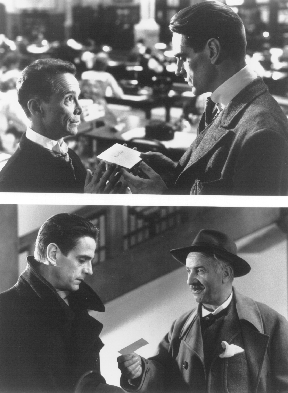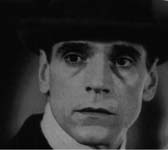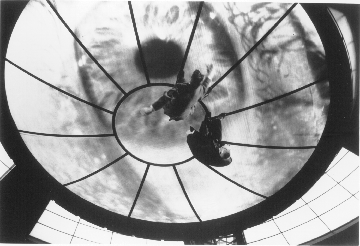Kafka (1991)
 Plot and My Pseudo-Analysis
and Review: To be brutally frank, this movie is what I would call
a "Kafka fanfic"; that is, characters from his life and works are mixed
together into a somewhat paranoid flick. It should be made clear
this is NOT based on any particular one of his stories, as some friends
of mine thought when they saw it. And the Kafka in the movie is and
isn't the real Franz Kafka; although much of the film steals shamelessly
from his life, the real Kafka was in fact a bit more friendly and genial,
although he could hardly hope to have undergone such an experience as the
one in the movie!
Plot and My Pseudo-Analysis
and Review: To be brutally frank, this movie is what I would call
a "Kafka fanfic"; that is, characters from his life and works are mixed
together into a somewhat paranoid flick. It should be made clear
this is NOT based on any particular one of his stories, as some friends
of mine thought when they saw it. And the Kafka in the movie is and
isn't the real Franz Kafka; although much of the film steals shamelessly
from his life, the real Kafka was in fact a bit more friendly and genial,
although he could hardly hope to have undergone such an experience as the
one in the movie!
Kafka, an insurance worker who writes in his spare
time "by myself, for myself" finds his best friend Eduard Raban has
been murdered and the more he finds out the more he is drawn into the shadowy
world apparently centered at the Castle, which looms over Prague.
He cannot escape until he reaches the bottom of the mystery. In the
words of the blurb on the back of the box: "The year is 1919. The
setting is Prague, Czechoslovakia, a shadow world of ominous alleyways
and winding cobbled streets. Oscar winner Jeremy Irons plays Kafka,
an insurance clerk and aspiring writer leading a staid and reclusive life—until
his closest friend mysteriously disappears without a trace.
"A seductive co-worker (Theresa Russell) leads Kafka
to a group of anarchists who speak of a 'cover up of monumental proportions'
controlled from within a castle outside the city. Searching for the
truth, Kafka ventures behind the castle's walls...and discovers a secret
more terrifying than anything he ever imagined."
 The (mostly) black and white photography of Prague is absolutely wonderful
to see; if nothing else the film could act as a beautiful travelogue.
The references to Kafka's life and works are everywhere; Raban is from
Wedding
Preparations in the Country, for instance, and the co-worker who also
has an interest in Raban, Gabriela Rossman, seems to be based on Milena
Jesenská, one of his female acquaintances. The name steals
from both Amerika (Karl Rossmann is the protagonist in that novel)
and one of his sisters, Gabriele. The movie is filled with frustrating
bureaucratic impasses, ŕ la The Trial and The Castle (there's
even a Buergel), and incidents in his life (for example, the Letter
to His Father is important in one scene), and so on. You could
play a very entertaining game of "Spot the Reference" if you were inclined
to do so.
The (mostly) black and white photography of Prague is absolutely wonderful
to see; if nothing else the film could act as a beautiful travelogue.
The references to Kafka's life and works are everywhere; Raban is from
Wedding
Preparations in the Country, for instance, and the co-worker who also
has an interest in Raban, Gabriela Rossman, seems to be based on Milena
Jesenská, one of his female acquaintances. The name steals
from both Amerika (Karl Rossmann is the protagonist in that novel)
and one of his sisters, Gabriele. The movie is filled with frustrating
bureaucratic impasses, ŕ la The Trial and The Castle (there's
even a Buergel), and incidents in his life (for example, the Letter
to His Father is important in one scene), and so on. You could
play a very entertaining game of "Spot the Reference" if you were inclined
to do so.
This would do little good if the story itself was
dull. But in fact I thought that the story was intriguing in itself.
The characters were well drawn, intriguing, and fascinatingly acted.
The plot twists involving the Castle and its paperwork were a little difficult
to follow, but that contributes to the "frustrating bureaucracy" aspect
of the movie. Near the end, the film does turn into a kind of horror
flick, although one in keeping with the plot. In sum, I liked the
movie and think it's worth a rental. Just my two cents.
Some Quotes
 Kafka's Friend: What are you working on?
Kafka's Friend: What are you working on?
Kafka: Oh, a thing about a man who wakes up
to find himself transformed into a giant insect.
(Kafka talking to Bizzlebek the gravedigger/stonecarver/sculptor)
Bizzlebek: But no one should call himself
an artist unless he's paid for it, and perhaps not even then.
Kafka: Yours is a very noisy line of work.
Bizzlebek: Well, it's external noise, whereas
you — the reverberations are inside. I've read your stories; they're
quite fantastic.
Kafka: I can't imagine what you could have
seen.
Bizzlebek: Oh, just what you've published.
Kafka: In magazines nobody reads. They
should be filed away in the Castle with all the other useless bits of paper.
Bizzlebek: Nonetheless, some of us take an
interest in your case. That one story, for instance, about the penal
colony—
Kafka: Hm?
Bizzlebek: The needles inscribing the judgment
into the flesh of the condemned man. It's...it's new. I need to
find a clever device to make my work more noticeable.
Kafka (narrating what is apparently a letter to his
mother): The terrible toil of the insurance office continues as ever.
I am continually harassed by petty tyrants, as I issue pointless reports.
My friend Eduard has disappeared. You never met him though because
I never dared bring a friend home, not with Father lording over us all
from his armchair. Now I gather Anna paid you a visit. My relations
with her have been...difficult, to say the least, and I can only hope Father
didn't frighten her away any further. Your son, your loving son,
your occasionally loving son, your incapable of loving son, your absolutely
bored to death with any sort of family life son.
Inspector Grubach: Kafka...Kafka...Kafka?
Is that your real name?
Kafka: Yes, why shouldn't it be?
Chief Clerk: I understand you fancy yourself
as a writer.
Kafka: In a small way.
Chief Clerk: You should find a more...athletic
hobby. Put some color in your cheeks.
(Kafka talking to his two totally incompetent assistants,
Ludwig and Oscar.)
Oscar: It's not too bad working here, though.
Kafka: You've never felt it was a horrible
double life from which there's probably no escape but insanity?
Ludwig: Yes.
Oscar: No.
Both: No.
Kafka: I envy you.
Oscar: You should be content, you know.
Ludwig: You should!

(Kafka narrates a somewhat shortened, altered Letter
to his Father.)
Kafka: Dearest Father,
I had always believed that it is better to know the truth than to live
in ignorance. Now I shall find out if I was right. I can no
longer deny that I am part of the world around me, nor can I deny, despite
our differences, that I remain your son. And so I hope only that
these late, perhaps insignificant, realizations might reassure us both
a little and make our living and our dying easier.
(Kafka prepares to enter the mysterious Castle.)
Kafka: You mentioned that you admire my work.
Bizzlebek: Yes...
Kafka: Would you do me a favor?
Bizzlebek: Another one?
Kafka: Well, if I don't see you later, would
you go to my house, find my notebooks, and destroy them. And all
of my manuscripts, they're none of them finished. Just burn them,
all right?
Bizzlebek: What an extraordinary request.
Kafka: A true friend would do it.
Bizzlebek: Not necessarily...A wife would!
(Laughs)
(Kafka after finding out the secret of the Castle.)
Kafka: I've tried to write nightmares, and
you've built one.

Directed by:
Steven Soderbergh
Written by:
Lem Dobbs
Cast:
Jeremy Irons .... Kafka
Theresa Russell .... Gabriela
Joel Grey .... Burgel
Ian Holm .... Doctor Murnau
Jeroen Krabbé .... Bizzlebek
Armin Mueller-Stahl .... Grubach
Alec Guinness .... The Chief Clerk
Brian Glover .... Castle Henchman
Keith Allen .... Assistant Ludwig
Simon McBurney .... Assistant Oscar
Robert Flemyng .... The Keeper of the Files
Matyelok Gibbs .... Concierge
Ion Caramitru .... Solemn Anarchist
Hilde van Mieghem .... Female Anarchist
Jan Nemejovsky .... Mustachioed Anarchist
Toon Agterberg .... Youthful Anarchist
Maria Miles .... Anna
Vladimir Gut .... Eduard Raban
Emil Wolk .... Man Under Microscope
Josef Abrhám.... Friend of Kafka
Guy Fithen .... Friend of Kafka
Zuzana Halustoková .... Friend of Kafka
Ondrej Havelka .... Friend of Kafka
Lenka Korínková .... Friend of Kafka
Petr Lepsa .... Friend of Kafka
Leon Silver .... Friend of Kafka
Debora Weston .... Friend of Kafka
Jan Slovak .... Man at Bar
David Shaw Parker .... Interrogating Attendant
Jerome Flynn .... Castle Attendant
Ewan Stewart .... Castle Attendant
James McPhee .... Castle Attendant
Lubos Rychvalsky .... Kidnapped Vagrant
Pavel Myslik .... Vagrant
Frantisek Stufka .... Vagrant
Petr Jakl .... Quarry Laborer
Karel Belohradsky .... Inspector's Assistant
Josef Sebek .... Inspector's Assistant
Robert Krejcik .... Evil Wagon Driver
David Jensen .... The Laughing Man
Vitezslav Bouchner .... Lens Room Cleaner
You .... Poor Bastard
Links
Franz
Kafka and Libertarian Socialism Here's an article from a "Libertarian Socialist" magazine, New Politics, claiming
that politically the real Kafka did indeed have a lot in common with the
"revolutionaries and anarchists" depicted in Kafka. However, it should be
taken with a grain (or a shaker) of salt, since much of the evidence rests on somewhat iffy
sources, such as Gustav Janouch, author of Conversations with Kafka,
whose authenticity has been strongly debated, and Michal Mares, an anarchist
who might not be the most objective of witnesses. But read it and make up your own mind!
For more information, visit the Internet
Movie Database.
Some Reviews:
Roger
Ebert
Washington
Post (1)
Washington
Post (2)
Frank Maloney
Pedro Sena
Return to the Movies page.
Back to Leni's Franz Kafka Page.
 Plot and My Pseudo-Analysis
and Review: To be brutally frank, this movie is what I would call
a "Kafka fanfic"; that is, characters from his life and works are mixed
together into a somewhat paranoid flick. It should be made clear
this is NOT based on any particular one of his stories, as some friends
of mine thought when they saw it. And the Kafka in the movie is and
isn't the real Franz Kafka; although much of the film steals shamelessly
from his life, the real Kafka was in fact a bit more friendly and genial,
although he could hardly hope to have undergone such an experience as the
one in the movie!
Plot and My Pseudo-Analysis
and Review: To be brutally frank, this movie is what I would call
a "Kafka fanfic"; that is, characters from his life and works are mixed
together into a somewhat paranoid flick. It should be made clear
this is NOT based on any particular one of his stories, as some friends
of mine thought when they saw it. And the Kafka in the movie is and
isn't the real Franz Kafka; although much of the film steals shamelessly
from his life, the real Kafka was in fact a bit more friendly and genial,
although he could hardly hope to have undergone such an experience as the
one in the movie!
 The (mostly) black and white photography of Prague is absolutely wonderful
to see; if nothing else the film could act as a beautiful travelogue.
The references to Kafka's life and works are everywhere; Raban is from
Wedding
Preparations in the Country, for instance, and the co-worker who also
has an interest in Raban, Gabriela Rossman, seems to be based on Milena
Jesenská, one of his female acquaintances. The name steals
from both Amerika (Karl Rossmann is the protagonist in that novel)
and one of his sisters, Gabriele. The movie is filled with frustrating
bureaucratic impasses, ŕ la The Trial and The Castle (there's
even a Buergel), and incidents in his life (for example, the Letter
to His Father is important in one scene), and so on. You could
play a very entertaining game of "Spot the Reference" if you were inclined
to do so.
The (mostly) black and white photography of Prague is absolutely wonderful
to see; if nothing else the film could act as a beautiful travelogue.
The references to Kafka's life and works are everywhere; Raban is from
Wedding
Preparations in the Country, for instance, and the co-worker who also
has an interest in Raban, Gabriela Rossman, seems to be based on Milena
Jesenská, one of his female acquaintances. The name steals
from both Amerika (Karl Rossmann is the protagonist in that novel)
and one of his sisters, Gabriele. The movie is filled with frustrating
bureaucratic impasses, ŕ la The Trial and The Castle (there's
even a Buergel), and incidents in his life (for example, the Letter
to His Father is important in one scene), and so on. You could
play a very entertaining game of "Spot the Reference" if you were inclined
to do so.
 Kafka's Friend: What are you working on?
Kafka's Friend: What are you working on?

